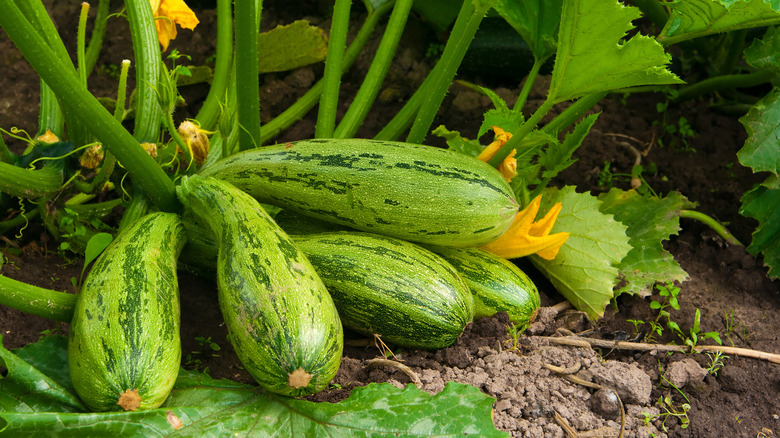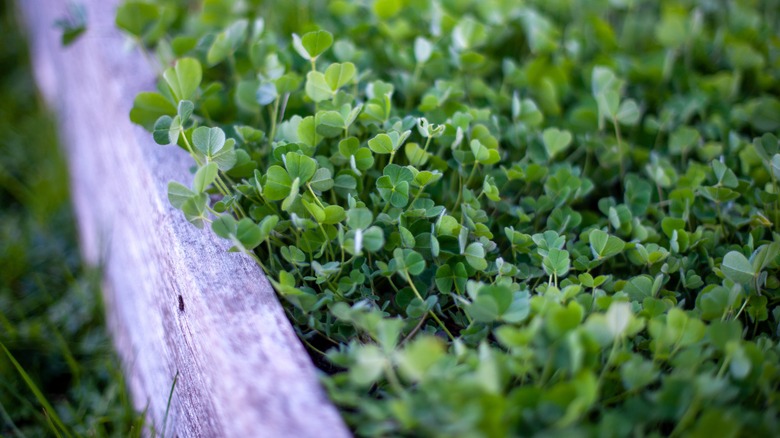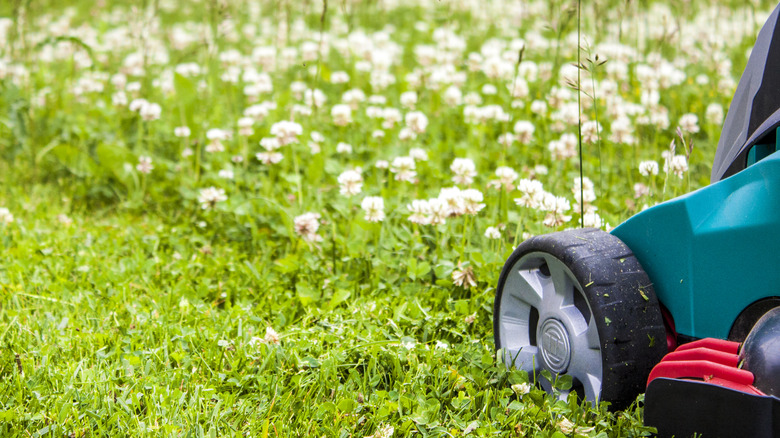The Beneficial Cover Crop That'll Help Your Zucchini Garden Thrive
Growing zucchini in your garden can be a fun and rewarding experience as just one plant can produce quite a prolific number of fruits all season if cared for properly. One way to help zucchini plants thrive in your yard is by utilizing a companion plant to provide further benefits. Known as a low-growing flowering herb, clover is sometimes used as a lawn replacement instead of grass due to many of the benefits that it can provide for your yard and garden. For starters, it can behave as a natural mulch, suppressing weed growth around the base of the zucchini plants that could compete for natural resources like nutrients, water, and sunlight. Moreover, clover grows in dense patches, so it can also provide shade to the soil, minimizing moisture loss from evaporation and keeping the plant well hydrated. At the same time, it also has deep roots which can improve the soil structure around the base of your zucchini plants.
In addition, clover is excellent at fixing nitrogen to the soil by capturing it from the atmosphere and converting it into a nutrient that the zucchini can absorb easily. This nitrogen can help your vegetable with healthy growth and food production through denser, green foliage while simultaneously eliminating the need for synthetic fertilizers. As a result, you can practice a much more sustainable garden right in your backyard. Finally, clover attracts beneficial insects like pollinators which help to pollinate the zucchini flowers, resulting in better and bigger fruit.
How to use clover as a cover crop
If all of these wonderful benefits of planting clover have enticed you, then it's time to head out back and start planting. You'll want to plan how to best incorporate clover into your garden arrangement as there are a few methods. A best practice for using clover in the garden is to actually plant it in the pathways around where your zucchini will grow, such as around raised garden beds. This will prevent the clover from becoming too aggressive at the base of the plants. Once your zucchini is well established in the garden, you can add your clover seeds, but this should still be done in early spring before weeds start to come in heavily. You can hand sow your clover seeds or use a seed spreader. When the clover grows in, it can easily be mowed along these paths to keep it in check. This way, you can treat it as a green manure that can regularly be mowed to continue adding nutrients to the soil nearby.
Another option would be to alternate rows of clover and zucchini, a process known as row intercropping. This method will also allow the clover to provide the same benefits to the zucchini as they grow side by side. Once both plants are established, it's important to keep the soil moist and monitor for any weeds that may skirt the clover ground cover. Mow the clover periodically to keep it in check.
Cautions for this duo
While growing your zucchini plants with a companion like clover is a great way to establish a rich and environmentally-friendly garden, there are some key points to consider before embarking on this journey. One possible concern is that certain species of clover can be aggressive, spreading quickly and competing for resources with your zucchini, especially if the zucchini are not well established yet. One way to combat this is to mow clover before it seeds to prevent it from spreading. A medium red clover is easy to maintain and will offer all of the benefits your zucchini will need to thrive. A perennial white clover, while offering these benefits, may be more difficult to contain to the intended pathways. Either way, you should regularly mow your clover to keep it from encroaching on your zucchini plants.
Another caution to keep in mind is that many varieties of clover require reseeding in order to keep up their dense, protective foliage. It may feel frustrating to have one that is either too aggressive or not aggressive enough, but it is a delicate balancing act to maintain a healthy garden. Depending on your climate, certain clovers are annuals and will need to be reseeded each year, so consider this commitment before choosing clover as your ground cover. On the other hand, this may be a benefit as it could help to eliminate the worry of having to keep your clover from invading the rest of your garden.


